倒装句 强调句等
not until强调句和倒装句
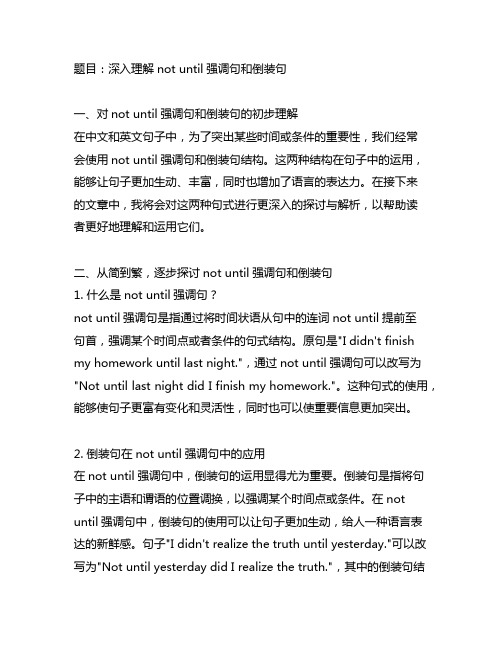
题目:深入理解not until强调句和倒装句一、对not until强调句和倒装句的初步理解在中文和英文句子中,为了突出某些时间或条件的重要性,我们经常会使用not until强调句和倒装句结构。
这两种结构在句子中的运用,能够让句子更加生动、丰富,同时也增加了语言的表达力。
在接下来的文章中,我将会对这两种句式进行更深入的探讨与解析,以帮助读者更好地理解和运用它们。
二、从简到繁,逐步探讨not until强调句和倒装句1. 什么是not until强调句?not until强调句是指通过将时间状语从句中的连词not until提前至句首,强调某个时间点或者条件的句式结构。
原句是"I didn't finish my homework until last night.",通过not until强调句可以改写为"Not until last night did I finish my homework."。
这种句式的使用,能够使句子更富有变化和灵活性,同时也可以使重要信息更加突出。
2. 倒装句在not until强调句中的应用在not until强调句中,倒装句的运用显得尤为重要。
倒装句是指将句子中的主语和谓语的位置调换,以强调某个时间点或条件。
在not until强调句中,倒装句的使用可以让句子更加生动,给人一种语言表达的新鲜感。
句子"I didn't realize the truth until yesterday."可以改写为"Not until yesterday did I realize the truth.",其中的倒装句结构使得句子表达更加强调切实感。
三、总结与回顾通过以上的探讨,我们可以发现not until强调句和倒装句这两种句式结构在句子表达中的重要性。
它们不仅可以丰富句子的表达方式,还可以使句子更加突出和生动。
专题11.必过语法---①强调句 ②倒装句 ③省略句 ④祈使句 ⑤感叹句 ⑥附加疑问句-2023年高

特殊句式1.特殊句式包括:①强调句①倒装句①省略句①祈使句①感叹句①附加疑问句2.高考考查热点:①强调句中的it和that①特殊句式中的there be①一些常用的固定表达结构高频考点突破考点1倒装句一、完全倒装完全倒装是指将句子中的谓语动词全部置于主语之前。
此结构通常只用于一般现在时或一般过去时。
二、部分倒装部分倒装是指将谓语的一部分,如助动词或情态动词,置于主语之前。
如果句中的谓语部分不含有助动词或情态动词时,则需添加助动词do, does或did,并将其置于主语之前。
将下列句子变为倒装句①She didn’t have supper until her mother returned.→Not until her mother returned .①I hardly think it possible to finish the job before dark.→Hardly .①He learned the sad news only after the war.→Only after the war .①He speaks English so clearly that he can always make himself understood.→So clearly .【答案】1.did she have supper2.do I think it possible to finish the job before dark3.did he learn the sad news4.does he speak English that he can always make himself understood考点2强调句强调句型的基本结构单句语法填空/补全句子①It was when I got back to my apartment I first came across my new neighbors.①It was only when the car pulled up in front of our house __we saw Lily in the passenger seat.① the noise of the street stopped.直到午夜,街上的嘈杂声才停止。
虚拟语气、强调句、倒装句

高考英语之虚拟语气归纳整理 - 高考英语之虚拟语气归纳整理虚拟语气是谓语动词的一种特殊形式,用来表达假设、主观愿望、猜测、建议、可能或空想等非真实情况。
如:He is honest. 他很诚实。
(陈述语气)Don‘t be late next time. 下次别迟到。
(祈使语气)If I were you ,I would not go. 我要是你,我就不会去。
(虚拟语气)I wish I had a lot of money. 要是我有很多很多钱就好了。
(虚拟语气)高考英语之虚拟语气归纳整理 - 第一类虚拟语气在条件句中的用法:条件句有真实条件句和虚拟条件句两种。
真实条件句所表示的假设是有可能发生的,此时主句不用虚拟语气;而虚拟条件句则表示一种假想,与事实相反或不大可能会发生,此时用虚拟语气。
如:If I have time,I will go. 假若我有时间,我就去。
(陈述语气)If I were yo u,I would go. 假若我是你,我就去。
(虚拟语气)时态类型主句谓语形式条件句的谓语形式例句与现在事实相反would/should/could/might+ V原动词过去式did*be 多用were1. If I were you, I shouldstudy English.2. I would certainly go if Ihad time.与过去事实相反would/should/could/might +have done动词过去完成式haddone1. If you had taken myadvice, you would not havefailed in the test.2. If I had left a littleearlier, I would have caughtthe train.与将来事实相反would/should/could/might + ①动词过去式1.If you came tomorrow, wewould have the mee ting. ①V原②should +V原③were+ to do 2. If it were to rain tomorrow, the meeting would be put off.③*规律总结:从句都往过去推一个时态,如:与现在相反的if从句就用过去时;与过去相反用过去完成时(即过去的过去)注:特别说明1、l would/should/could/might主句谓语中的should主要用于第一人称后;would表示结果还表示过去经常常常做某事,might表示可能性,could表示能力、允许或可能性。
高三特殊句式之——倒装句和强调句练习题(含答案解析)
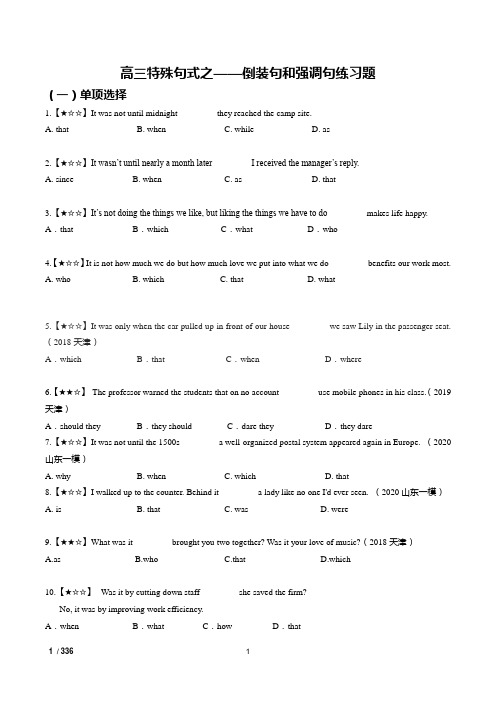
高三特殊句式之——倒装句和强调句练习题(一)单项选择1.【★☆☆】It was not until midnight ________ they reached the camp site.A. thatB. whenC. whileD. as2.【★☆☆】It wasn’t until nearly a month later ________I received the manager’s reply.A. sinceB. whenC. asD. that3.【★☆☆】It’s not doing the things we like, but liking the things we have to do ________ makes life happy. A.that B.which C.what D.who4.【★☆☆】It is not how much we do but how much love we put into what we do ________ benefits our work most.A. whoB. whichC. thatD. what5.【★☆☆】It was only when the car pulled up in front of our house ________ we saw Lily in the passenger seat.(2018天津)A.which B.that C.when D.where6.【★★☆】The professor warned the students that on no account ________ use mobile phones in his class.(2019天津)A.should they B.they should C.dare they D.they dare7.【★☆☆】It was not until the 1500s ________ a well-organized postal system appeared again in Europe. (2020山东一模)A. whyB. whenC. whichD. that8.【★☆☆】I walked up to the counter. Behind it ________ a lady like no one I'd ever seen. (2020山东一模)A. isB. thatC. wasD. were9.【★★☆】What was it ________ brought you two together? Was it your love of music?(2018天津)A.asB.whoC.thatD.which10.【★☆☆】--Was it by cutting down staff ________ she saved the firm?--No, it was by improving work efficiency.A.when B.what C.how D.that11.【★★★】--- ________ makes your son feel blue today?-- ________ to watch his favourite cartoon Paw Patrol.A.What it is that; To be forbidden B.What is that; ForbiddenC.What is it that; Being forbidden D.That is what; Having forbidden12.【★☆☆】It was the culture, rather than the language, ________ made it hard for him to adapt to the new environment abroad.A.where B.why C.that D.what13.【★☆☆】It was when we were returning home ________ I realized what a good feeling it was to have helped someone in trouble.A.which B.that C.where D.how14.【★☆☆】It was only when the car pulled up in front of our house ________ we saw Lily in the passenger seat.A. whichB. thatC. whenD. where15.【★★★】________ not for the support of the teachers, the student could not overcome her difficulty.A. It wereB. Were itC. It wasD. Was it16.【★☆☆】Bach died in 1750, but it was not until the early 19th century ________ his musical gift was fully recognized.A.while B.though C.that D.after17.【★★★】Out of suffering ________ .A.have emerged the strongest souls B.emerged the strongest souls haveC.have the strongest souls emerged D.the strongest souls have emerged18.【★★☆】Along with enthusiasm for composing music ________ his devotion to cultivating young people's passion for music.A.come B.comes C.Coming D.to come19.【★★★】________ , his ideas was accepted by all the people at the meeting.A.Strange as might it sound B.As it might sound strangeC.As strange it might sound D.Strange as it might sound20.【★★☆】It is ________ he said ________ is very important to me.A.what; that B.that; that C.all that; what D.which; that21.【★★☆】—I learned that Francis Chichester was knighted by Queen Elizabeth Ⅱ.—Yes, so ________ and so ________ .A.he was… was Sir Francis Drake B.was he… Sir Fra ncis Drake wasC.he did… the same with Sir Francis Drake D.he was… Sir Francis Drake was the same22.【★★☆】It was through her small but very powerful words ________ she said everything that needed to be said, and it truly changed my life.A.which B.that C.in which D.when23.【★★★】It is in the hall ________ can house 10,000 people ________ the opening ceremony of the Global 5G Technology Summit will be held.A.which; that B.where; that C.which; who D.where; whom.24.【★☆☆】It was in the Lake District, a tourist attraction in England ________ they met each other and became fast friends.A.where B.which C.when D.that(二)翻译练习一、英译汉1. Never in her life had she tasted anything better.翻译:__________________________________________________________________________________________ 2.It is only by listening to and understanding each other that problems between parents and children can be settled. 翻译:__________________________________________________________________________________________ 3. And it was in Chile she discovered she could get last-minute cheap deals on ships going to Antarctica from the islands off Tierra del Fuego, the southernmost tip of the South American mainland.(2022全国甲卷C篇)翻译:____________________________________________________________________________________________________________________________________________________________________________________ 4. In the afternoon, we delivered a lecture to the students there. Not only did we give them tips on how to choose proper books for themselves, but also guided them on how to read different kinds of books.翻译:__________________________________________________________________________________________ 5. It was then that we enjoyed a symphony of nature——the warm breeze ruffling through the trees, the insects buzzing and other animals contributing their unique sounds.翻译:__________________________________________________________________________________________二、汉译英【★★★】1. 直到那只兔子完全消失在我们的视线中,我们才不追了。
倒装,强调,反义疑问句,感叹句
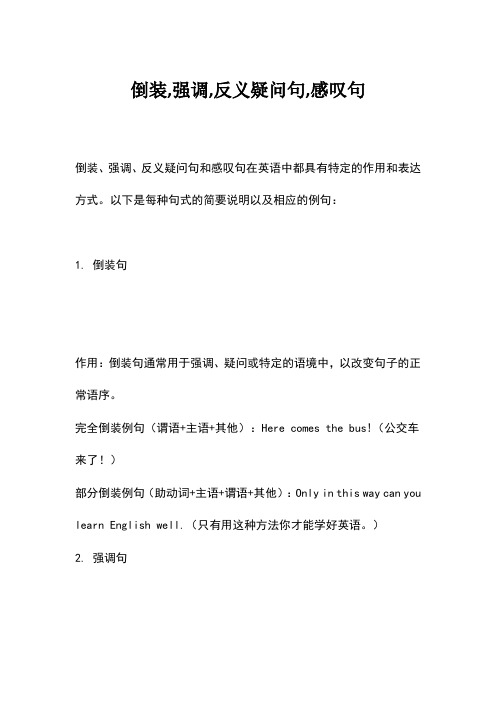
倒装,强调,反义疑问句,感叹句
倒装、强调、反义疑问句和感叹句在英语中都具有特定的作用和表达方式。
以下是每种句式的简要说明以及相应的例句:
1. 倒装句
作用:倒装句通常用于强调、疑问或特定的语境中,以改变句子的正常语序。
完全倒装例句(谓语+主语+其他):Here comes the bus!(公交车来了!)
部分倒装例句(助动词+主语+谓语+其他):Only in this way can you learn English well.(只有用这种方法你才能学好英语。
)
2. 强调句
作用:强调句用于突出句子中的特定信息,通常是使用“It was … that”结构。
例句:It was John who broke the window.(是约翰打破了窗户。
)3. 反义疑问句
作用:反义疑问句用于确认或询问信息,通常由陈述句和一个附加的简短疑问句组成。
例句:You are coming to the party, aren't you?(你要来参加聚会,不是吗?)
4. 感叹句
作用:感叹句用于表达强烈的情感,如惊讶、喜悦、愤怒等。
通常由what或how引导。
What引导的例句:What a beautiful day it is!(天气多好啊!)How引导的例句:How fast he runs!(他跑得多快啊!)。
高中英语特殊句式-倒装句和强调句
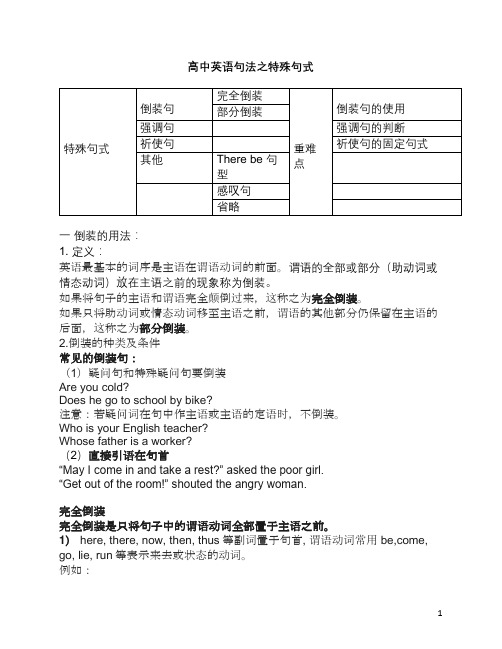
高中英语句法之特殊句式一倒装的用法:1. 定义:英语最基本的词序是主语在谓语动词的前面。
谓语的全部或部分(助动词或情态动词)放在主语之前的现象称为倒装。
如果将句子的主语和谓语完全颠倒过来,这称之为完全倒装。
如果只将助动词或情态动词移至主语之前,谓语的其他部分仍保留在主语的后面,这称之为部分倒装。
2.倒装的种类及条件常见的倒装句:(1)疑问句和特殊疑问句要倒装Are you cold?Does he go to school by bike?注意:若疑问词在句中作主语或主语的定语时,不倒装。
Who is your English teacher?Whose father is a worker?(2)直接引语在句首“May I come in and take a rest?” asked the poor girl.“Get out of the room!” shouted the angry woman.完全倒装完全倒装是只将句子中的谓语动词全部置于主语之前。
1) here, there, now, then, thus等副词置于句首, 谓语动词常用be,come, go, lie, run等表示来去或状态的动词。
例如:Here comes the bus! (=The bus is coming here! 用一般现在时表示正在进行的动作。
)There goes the bell! = The bell is ringing. 铃响了!Then came the chairman. 那时总裁来了。
Then came the hour we had been looking forward to.我们期盼的时候到了。
Here is your letter. 你的信。
2)表示运动方向的副词或地点状语置于句首,以out, in, up, down, off, away等副词开头,谓语动词是表示“移动”的go, come, leave等句子里。
高中英语 高三+倒装句、强调句及其他句式在写作中的应用
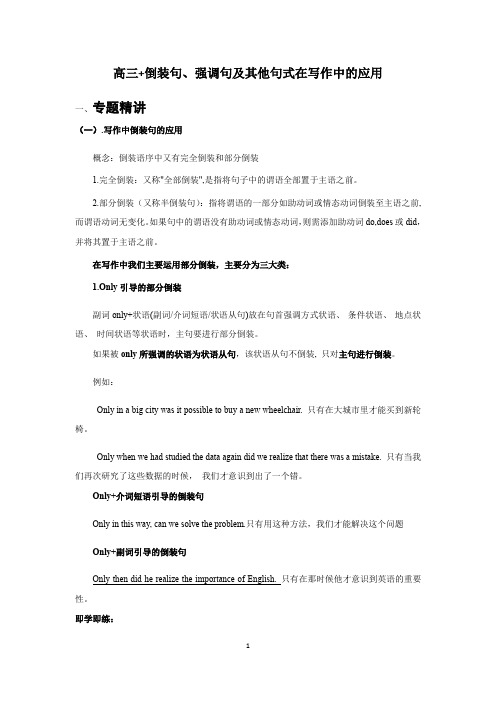
高三+倒装句、强调句及其他句式在写作中的应用一、专题精讲(一).写作中倒装句的应用概念:倒装语序中又有完全倒装和部分倒装1.完全倒装:又称"全部倒装",是指将句子中的谓语全部置于主语之前。
2.部分倒装(又称半倒装句):指将谓语的一部分如助动词或情态动词倒装至主语之前,而谓语动词无变化。
如果句中的谓语没有助动词或情态动词,则需添加助动词do,does或did,并将其置于主语之前。
在写作中我们主要运用部分倒装,主要分为三大类:1.Only引导的部分倒装副词only+状语(副词/介词短语/状语从句)放在句首强调方式状语、条件状语、地点状语、时间状语等状语时,主句要进行部分倒装。
如果被only所强调的状语为状语从句,该状语从句不倒装, 只对主句进行倒装。
例如:Only in a big city was it possible to buy a new wheelchair. 只有在大城市里才能买到新轮椅。
Only when we had studied the data again did we realize that there was a mistake. 只有当我们再次研究了这些数据的时候,我们才意识到出了一个错。
Only+介词短语引导的倒装句Only in this way, can we solve the problem.只有用这种方法,我们才能解决这个问题Only+副词引导的倒装句性。
即学即练:一.翻译:1.只有这样你才能学好英语。
2.只有当他病的很重的时候他才留在家里。
3.只有坐船我们才能到达那个小岛。
4.只有在这里你才能找到你想要的。
5.只有那时候他才明白生命的价值。
6.只有在他死后他的作品才被人知道。
7.只要你努力你就会取得成功。
二.改写句子1.We realized that we were wrong then.2. You can learn English well in this way.3. He was able to return home when the war was over.4. I went to bed last night when he came back from work.5.He learned the sad news after the war.6.You are allowed to go out to play after you finish your homework.参考答案:二.改写句子1.Only then did we realize that we were wrong.2.Only in this way can you learn English well.3.Only when the war was over was he able to return home.4.Only when he came back from work did I go to bed last night .5.Only after the war did he learn the sad news.6.Only after you finish your homework are you allowed to go out to play.2.否定词引导的部分倒装否定副词或短语位于句首时,如Hardly,seldom,little,few,never,nowhere,no longer,By no means,in no way,under no circumstances,on no account,要部分倒装.例句:Everyone knows that we are busy all busy.Seldom do we know what is happening both at home and abroad.我们每天都很忙,很少知道国内外发生了什么。
not until 强调句和not until的倒装句

not until 强调句和not until的倒装句:
1.not until的强调句型:可用于表示强调的语气
"not until"强调句型:"It is / was not until + 从句/表示时间的词+ that + 句子的其余部分"。
例如:
It was not until yesterday that she started her new job.(直到昨天她才开始新工作。
)
It is not until you lose something that you realize its value.(只有当你失去了某样东西时,你才会意识到它的价值。
)
这种结构用于强调特定事件发生的延迟,特别强调了某个行动或情况直到特定时间才发生。
2.not until的倒装句型:可用于表示强调的语气
not until的倒装句型:"not until"引导的倒装句常常用于句首,构成否定句并强调时间延迟。
这种结构的句子是这样的:Not until + 从句/表示时间的词+完全倒装的主句(谓语+主语)。
例如:
Not until tomorrow will she start her new job.(直到明天她才会开始新工作。
)
Not until the guests arrived did we begin to prepare dinner.(直到客人到达我们才开始准备晚餐。
)
这种结构用于强调在特定时间之前某个事件未发生或行动未进行。
- 1、下载文档前请自行甄别文档内容的完整性,平台不提供额外的编辑、内容补充、找答案等附加服务。
- 2、"仅部分预览"的文档,不可在线预览部分如存在完整性等问题,可反馈申请退款(可完整预览的文档不适用该条件!)。
- 3、如文档侵犯您的权益,请联系客服反馈,我们会尽快为您处理(人工客服工作时间:9:00-18:30)。
一.强调句1.基本的强调句的结构○1It is\was + 被强调的部分+that\who +其他部分(强调的可以是主语、宾语、状语不可以强调谓语)何时用that 何时用who?例句:My father did the experiment in the lab yesterday evening.强调主语:强调宾语:强调时间:强调地点:○2如何构成强调句的一般疑问句Eg.Was it my father who did the experiment in the lab yesterday evening?○3如何构成强调句的特殊疑问句?Who was it that broke the window?When ws it that you succeeded ?What was it that you wanted me to do? 2.not …until 的强调句式it is\was not until+被强调的部分+that+其他成分例句:He did’t go to bed until 11o’clock last night.It was not until 11o’clock last night that he went to bed.It was not until he took off his dark glasses that I realized he was a famous film star.3.强调句型有时可用It might be…that …;It must have been …that …表示。
It might be his father that you are thinking of.It must have been his brother that you saw. 4.如果强调谓语的话,要借助助动词do并且此时的do是有人称、数、和时态的变化意思是“确实、的确”例句:Do come here this evening.He did write to you last week.5. 强调句型与其他太有It句型的区别(1)It is there that accidents often happen.It is a fact that English is being accepted as an international language.(2)It is novels that Miss Williams enjoys reading.It is a question that needs careful consideration.(3)①It was at 6 o’clock that I got up today.It was 6 o’clock when I got up today.②It was two years ago that I began to learn English.It is two years since I began to learn English.③It was two years before he came back from abroad.It was two years later that he came back from abroad.(2007 山东) ----where did you get to know her ?------it was on the farm _____we worked.A. thatB. thereC. whichD.where①It was in New Zealand ___ Elizabeth first met Mr. Smith.A. thatB. howC. whichD. when②Not until the motorbike looked almost new _________ repairing and cleaning it.A. he stoppedB. did he stopC. stopped heD. he did stop③So much of interest ___ that most visitors simply run out of time before seeing it all.A. offers BeijingB. Beijing offersC. does Beijing offerD. Beijing does offer④---how was the televised debate last night?-----super! Rarely _____ so much media attention.A. a debate attractedB. did a debate attractC. a debate did attractD. attracted a debate二、倒装句1、全部倒装,即谓语动词在主语前面。
○1在there be 句型中(其中的be动词还可以换成seem,live,stand ,lie,appear,exist,come等动词)要全部倒装。
Long long ago,there lived a king who liked horse very much.Since you have repaired my TV set, there is no need for for me to buy a new one.○2such 在句中作表语或定语位于句首时,要倒装。
Such was the force of the explosion that all the window were broken.Such a moving film was it that they were all lost in thought after it was over.○3以there , here ,now ,then, thus 等引起的句子中,谓语动词用be, come ,go等。
要全部倒装。
Here are some picture-books.Then came a new difficulty.如果主语是代词则不用倒装Here they are.○4以“down, up, out , away”等表示位置转移的副词位于句首时,要到装。
In came the teacher.Out he rushed.○5地点状语位于句首,变成强调地点时,要倒装。
On the top of the hill stands a temple where the old man once lived.○6形容词、分词作表语提到句首时,为了描述生动或平衡句子结构,要倒装。
Standing beside the window was a boy aged about 6.Seated in the first line are some advanced workers.(2007 陕西)____ that Marie was able to set up new branches elsewhere.A. so successful her business wasB. so successful was her businessC. so her business was successfulD. so was her successful businesse2. 部分倒装。
即只把谓语的一部分(多为助动词或情态动词)置于主语之前,为部分倒装句。
○1only 修饰状语位于句首时。
Only then did I realize the importance of math.Only in this way can you solve the problem.Only being injured will some animals attack a human being.p.s. only修饰主语时不用倒装only Tom knows the result of the interview.It was announced that only when the fire was under control ___ to return to their homes.A. the residents would be permittedB. had the residents been permittedC. would be residents be permittedD. the residents had been permitted○2so +系动词\助动词\情态动词\+主语,用在肯定句中表示“也….”,句子要倒装。
Pioneer men and women endured terrible hardship, and so did their children.I went there yesterday, so did she.p.s. 若两个动词的形式不一样时,就得用so it is with..或者so it is the case with….如__Jane is a good student and works hard.__so it is with tom.p.s. 若两个主语一致时则表示强调,不能倒装。
此时的so表示“的确如此”__it was cold yesterday.__so it was.(2007 江苏) -----my room gets very cold at night .----_____A. so is mineB. so mine is C . so does mine D . so mine does○3neither ,nor 用于否定句表示“也不”时,要倒装。
Tom doesn’t like bananas, neither do I .If you don’t go to the concert tonight, nor will I .__ I don’t think I can walk any further.__ neither can I ! let’s stop here for a rest.Bill wasn’t happy about the delay of the report by Jason, and ______A. I was neitherB. neither was IC. I was eitherD. either was I○4否定副词或短语置于句首时,要倒装。
